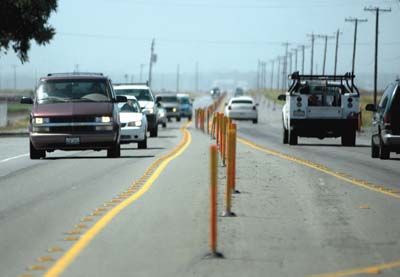During Tuesday’s discussion of the history of the State Route 25 Improvement Project that should have been in place to expand the highway to four lanes in San Benito County, hopefully to meet the same in Santa Clara County, I was amazed to discover it was not in the transportation plan. The reason was because the agency boards were struck with rare cases of absolute honesty when dealing with another government agency. These were the first cases on record, locally.
To keep the project, an enormous benefit to more than 30 percent of the population that commutes daily, on the high priority list the board had to determine that they were “reasonably certain” that funding would be available decades into the future.
The term reasonably certain is a government invitation to fudge – it begs for an affirmative answer. However, a group of politicians that often goes out of its way to fudge almost everything they say or do and sometimes to keep the public in the dark, had a rare attack of moral certitude. They just could not bring themselves to say they were reasonably certain they were going to get adequate tax and/or impact fees to help pay for the Route 25 widening so they could remain eligible for state and federal funds.
Now you have to understand that being anti-development and keeping Hollister’s population caged up deep in the county had absolutely nothing to do with it (sarcasm alert). If they don’t have the tax money in hand, they are not going to take any chances. Somehow that does not appear to apply to other risky ventures such as the Resource Recovery Park – it’s only a highway thing.
This week, federal politicians were everywhere selling the benefits of the renewing Highway Trust Fund. As part of that propaganda offensive they left the impression that the fund will fill every pothole, rebuild every interchange, and reduce every commute. They were not lying, per se; they are merely fudging, a time-honored way of not telling the whole truth and not correcting mistaken impressions. Cornered years hence about why something was not fixed, and they will have a raft of standard excuses – “We had to prioritize,” or “I never said we would fix that particular problem,” etc.
Everyone knows that if you want to shut a project down you do not have to go on strike. All you have to do is slavishly follow every rule in excruciating detail and everything will grind to a halt. That is essentially what they did years ago. Reasonably certain? Certainly not us. Now come the crocodile tears and the buck passing to reduced impact fees. It’s not even a serious argument because, as the recent Great Recession demonstrated, economic factors are dynamic and you are not supposed to put in impact fees without analyzing the impact or keep the same fees in place for decades.
They also totally ignored one of the most powerful economic tools in their arsenal: the legalized extortion counties use all the time to negotiate development agreements; “You want to build and we want highway improvements, it’s a deal – let’s go have lunch.”
Oh, I forgot we can’t reasonably expect to legally extort, I mean invite, developers to sweeten the pot. As one speaker noted, we never get it because we never ask for it. Is it any wonder we are going nowhere economically; our key negotiators are all in the hospital with a serious, but rare, case of selective, absolute honesty.










